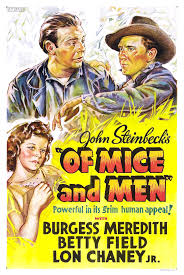Reed Books: Of Mice and Men
December 19, 2019
Set in California during the Great Depression, Of Mice and Men is a heartbreaking glance into the lives of migrant workers, struggling to keep themselves sane in such desperate times. The Great Depression led to large groups of workers traveling across the country for jobs at farms and ranches, since they required little education. While the readers never see these dots directly connected in the book, the effects of such a detached lifestyle play out nicely. Of Mice and Men draws on the themes of social power, oppression, and loneliness, particularly in the primary dynamic of the novel: George and Lennie.

The book comments on how the uninvolved life of migrant workers leads to a lack of emotional connection – not only to each other, but to anyone they may meet. One of the most obvious examples is Candy’s dog being shot in the early chapters. The other men, particularly Carlson, cannot understand why Candy would be upset about the animal; he is old and useless, therefore, disposable. Slim often tries to console Candy by offering him a new pup, despite the emotional loss of losing an old dog. The men are not being actively cruel – they genuinely cannot comprehend why Candy would be upset. And in a world where you may have to pick up everything and move at a moment’s notice, or when a coworker may be killed with machinery or left to starve, it’s hard to blame these men for their emotional detachment. This matter-of-fact treatment of death foreshadows Lennie’s death, at the hands of George; George kills Lennie out of mercy, while the others cannot understand why he would be upset to do this.
This emptiness doesn’t just impact the actual workers, however – anyone around them is just as affected. Curley’s wife, who goes unnamed as a mark of her social oppression, is assumed to be flirtatious because she talks to the men so much. Her real intentions are never revealed, but it can be assumed through her occasional outbursts that she really just wants a human connection with someone. Curley treats her like an object, and there is no other woman on the ranch to keep her company. When she finally finds Lennie, who will genuinely listen to her, it leads to her death as a result of his misunderstanding. Had the ranch life had more human touch, this event could’ve been avoided.
The problem with the migrant worker’s life, according to Steinback, is not the hard labor or small pay. It’s the detachment from humanity, the complete isolation of oneself to survive. And while it may not be pretty, Of Mice and Men conveys just that perfectly.















































